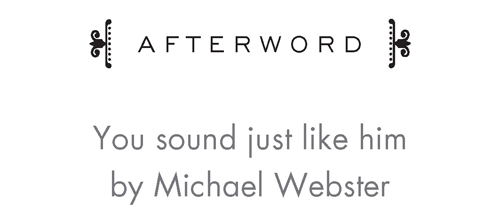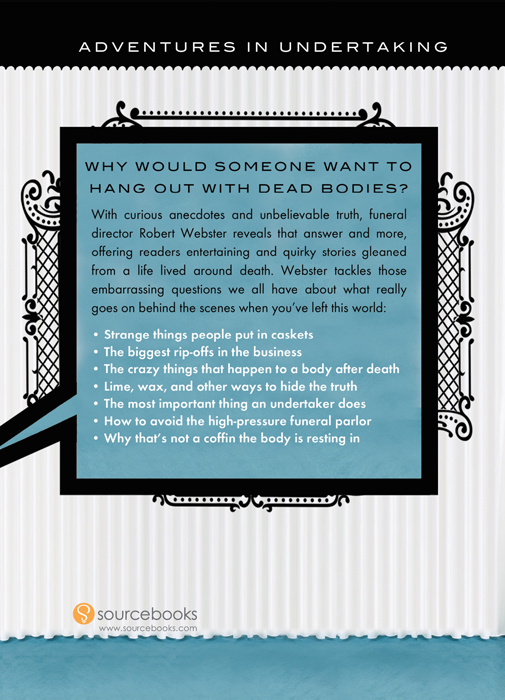Does This Mean You'll See Me Naked? (20 page)
Read Does This Mean You'll See Me Naked? Online
Authors: Robert D. Webster

One day when I was about twelve, my dad came home boasting of a pocketful of change he had won at poker. Apparently, when there was nothing to do at the funeral home where he was employed, he and his coworkers would while away the afternoon playing cards. As he described the various hands that had made him that day's “big wiener,” as he put it, I couldn't help thinking that anyone who played games while on the clock must have one terrific deal. “That,” I told myself, “is the job for me.”
More seeds were planted each time Dad brought home yet another gruesome tale of unidentifiable remains and proceeded to tell it at our dinner table. Although he had my rapt attention, my mom wasn't exactly thrilled. As I grew older, Dad began taking me outside on the porch whenever he felt the urge to describe one more eyebrow-raising story about his day.
Around the time I decided to attend college to major in mortuary science, my dad was experiencing the itch to stop working for the man and become the man himself. In 2001, he opened his own funeral home and was finally able to run things as he saw fit. By then, I was completely aware that history would repeat itself. I would, like him, set myself up for years, perhaps decades, of working for somebody elseâbut at least it would be my own father. How hard could it be?
What I didn't yet realize, of course, was that Dad would hold me to far higher standards than he would any other employee. Even today, regardless of whether we're embalming, dressing, or just cleaning up, if things do not take place in the manner or sequence that my father expects, then everything I have done is for naught. I've wasted my timeâand far more important, I've wasted his. His voice rises to an outside level, even though its only destination is my ears, a mere two feet away.
I have to admit that, on a few occasions, the yelling was justified. My thought process, which darts from one end of the spectrum to the other in the wink of an eye, might sometimes be described as scattered.
A woman phoned our funeral home one day to inquire as to where she might send flowers for an upcoming service. I told her she could just send them to the church of her choice, not realizing that the deceased's family wasn't holding a church service, only brief remarks following a visitation. Of course Dad used his outside voice to proclaim that it was always my responsibility to find out what was going on without assuming anything.
Another time a young woman had passed from cancer, and her cemetery procession of devoted friends and loved ones was extremely long, about seventy-five cars. The first half of the line pulled out of the church's parking lot successfully. But then one car made the mistake of stopping, and oncoming traffic began whizzing byâa serious breach of funeral etiquette, but that's a whole other story. By the time the latter half of the line attempted to get moving, each vehicle had to wait for a traffic lull.
I sprinted down to the highway's nearby intersection and stopped the oncoming cars to keep the rest of the procession together. But I again had made the mistake of assuming wrong. I thought Dad had made a right turn out of the lot instead of going left. So I sent the second half to the right, and nobody who headed in that direction ever made it to the cemetery. Several family members called the funeral home over the next half hour to locate the grave site, and one man in particular returned in person to insist that it was our home's fault he couldn't find it. He kept saying, “Now, I am not blaming y'all, but I don't know who else's fault it could be.”
After hearing that about ten times, I'd had enough. Loudly and harshly, I blurted, “Sir, you are blaming me!” He fired back, “Boy, I'll whoop you right where you stand! Don't you get tough with me!” I snickered, wondering if he was planning to hit me over the head with his AARP membership card.
Needless to say, my dad was not thrilled. Even my mom was upset. And it pains me to confess that both of them were legitimately peeved. Tolerance back then was not my strong suit. I hadn't been seeking a way to resolve the problem so that all of us could walk away happy; instead, I'd taken a defensive stance, ready to step outside and engage in fisticuffs if needed. I clearly had a lot to learn.
Gradually things got better. One day after lunch, a gentleman came in and told me that his father was being cared for in hospice and had only a few days left. I suggested a prearrangement and filled out biographical information for the impending death certificate. We chatted for another fifteen minutes, and he agreed to call us when the time came.
A few days later when we got the notification, I was out securing a doctor's signature on another death certificate and braving the icy personality of his receptionist. (Medical receptionists generally consider people like me total nuisances.) When I returned to the funeral home, Mom told me that Dad had already left to pick up the body, but the son and his wife were waiting.
I sat down with them; discussed merchandise and services; and before I knew it, all arrangements had been completed. Everything had gone smoothly. The following day, after I'd made my usual rounds, Mom told me the gentleman had just dropped off his father's clothing and paid the bill in full. He'd also told her what a nice person I was and how calm, professional, and knowledgeable I'd been. I'd never expected that kind of a compliment so early in my career, particularly since during the entire meeting I'd been telling myself, “Don't screw this up. Give him the correct price, and calculate the sales tax accurately.”
What have I learned over the years from my father? That being a renowned and respected funeral director with a sterling reputation for treating other people well requires constant effort and attention to detail. It's about far more than just working visitations, keeping up on paperwork, missing your son's baseball game, or leaving a holiday party early. It's also about compassionately helping another family from beginning to end through one of the toughest ordeals that life inevitably hands us.
Dad has also taught me that, in most cases, the customer is right. Sometimes, regardless of the business you're in, whatever you do will never be enough. So Dad has repeatedly stressed the virtue of patience and the need not to get worked up over uncontrollable variables. Patience was apparently not a gift that God ever thought Websters should have. I've had to work at it. But I've learned that with patience comes experience and with experience comes confidence.
So much of this job involves waiting. When things are slow, we wait for the phone to ring. When a death occurs, we wait for a son who lives twenty-five miles away to come to view his mom before we can carry her away. All of the puzzle pieces must line up and fit together, and some outward force is needed to push them in the right direction. In every case, once I figure out how to harness that force, then apply it appropriately, this business becomes the most rewarding, fulfilling thing I could ever imagine.
I've seen the way people greet my father at a visitation, or anywhere in public for that matter. They're so warm and friendly, so genuinely glad to see him. They really want to hear about his business and about how our family is doing. And we know they'll call us whenever the death of a loved one occurs because of the kindness and concern that my dad has always projected.
What's comical, though, is how often we are mistaken for each other. Over the phone our voices sound nearly identical. Whenever I answer with a hearty “Webster Funeral Home,” the response is almost always, “Bob?”
“No. Michael.”
“You sound just like him.”
“I know. Please don't hold that against me.”
At visitations I often hear, “Ahh, so you are Bob's boy,” or, “OK, now I can put a face with the voice.” Soon I hope it will be, “Hey, good to see you, Michael. You keeping that old man of yours out of trouble?”
Yes, I amâjust as soon as I can find him a hobby.

Robe
rt D. Webster has been a licensed embalmer and funeral director in the state of Ohio since 1977. As a teenager he was initiated into the funeral home business by mowing the grass, washing the cars, and performing other menial, yet important at the time, duties that served as a springboard for his eventual chosen profession. He completed grade school, junior high, and high school in Hamilton, Ohio, and graduated from Miami University and the Cincinnati College of Mortuary Science. Upon licensure, he worked for other funeral homes in the area for twenty-four years. He opened The Webster Funeral Home in 2001 in Fairfield, Ohio.
